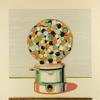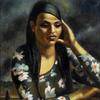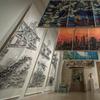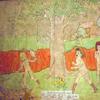'Guo Pei: Couture Fantasy' to Explore Extraordinary Fashion Displayed in European Art Galleries at San Francisco's Legion of Honor
- December 02, 2021 21:13
Through exquisite craftsmanship, lavish embroidery, and unconventional dressmaking techniques, designer Guo Pei creates a couture fantasy that fuses the influences of China’s imperial past with export art, the grandeur of European court life, architecture, and the botanical world. The Fine Arts Museums of San Francisco is set to celebrate Guo Pei’s extraordinary designs with Guo Pei: Couture Fantasy, April 16 to Sept. 5, 2022, the first comprehensive exhibition of her groundbreaking work. The exhibition will include more than 80 ensembles from the past two decades, highlighting the designer’s most important fashion collections, shown on Beijing and Paris runways, including many designs that have never before been shown to the public. Couture Fantasy will be exclusively presented at the Legion of Honor.
“Drawing inspiration from European and Chinese artistic traditions, Guo Pei’s creations blur the boundaries between art and fashion. Displayed in a neoclassical architectural context at the Legion Honor, amidst our collection of European art, Pei’s designs will encourage our visitors to consider the rich historical ties between China and the West.” states Thomas P. Campbell, Director and CEO of the Fine Arts Museums of San Francisco: “San Francisco, with our position on the Pacific Rim and our significant Chinese heritage, is a natural location to premiere the first major museum exhibition on Guo Pei’s work and we are delighted to present her exquisite designs to US audiences.”
In the early twenty-first century, China emerged as a leader in the fashion world. The exhibition explores the career of Guo Pei—hailed as China’s first couturier—within this context. Couture Fantasy is presented as part of the Museums’ Costume and Textile arts global exhibition program, which highlights extraordinary artists and movements that have changed the course of fashion history. Recent exhibitions include Patrick Kelly: Runway of Love and Contemporary Muslim Fashions.
Artist and designer Guo Pei says: “As a creator and artist, there is no greater honor or privilege than to share my creativity with a wider audience. I am therefore honored and humbled that the prestigious Legion of Honor Museum will be presenting a retrospective of my work. In doing so, I hope that it will bring greater awareness and understanding of my life’s passion, and convey Chinese culture, traditions and show the new face of contemporary China.”
Couture Fantasy will invite visitors on a journey into Guo Pei’s creative universe with designs displayed throughout the permanent collection and special exhibition galleries at the Legion of Honor, transforming the museum into a palace of couture.
The museum’s collections of European painting and decorative arts are presented in a suite of galleries designed in the neoclassical style on the Legion of Honor’s main floor. As a metaphor for the intercontinental world in which we live, opulent and intricate designs by Guo Pei will be displayed in these galleries. The dialogues created will highlight the sculptural nature, and the historical and iconographical references made by the designer in her creations.
Examples include the “Phoenix” gown from the designer’s Legend of the Dragon collection (2012), presented as the guest of honor in the museum’s popular grand gilded historical French reception room, the “Salon Doré. The majestic gold-embroidered “Dajing” (“Magnificent Gold”) ensemble from the Samsara (Lifecycle) collection (2006) will take center stage among works of French and Italian Baroque and Rococo art. Gowns from the Legends collection, inspired by the Abbey of St Gall in Switzerland, will be situated among the saint icons and Madonna figures that populate the medieval gallery. Several pieces from the Encounter and Courtyard collections (both 2016) will be interspersed in the French and British painting and Decorative Arts galleries, highlighting the transcultural resonance of Guo Pei’s designs. A gallery will be dedicated to a special presentation that juxtaposes objects from the Museums’ collections of Chinese export art and European chinoiserie—including a tapestry, vases, and a tea set—with Guo Pei’s “Porcelain” dress from the One Thousand and Two Nights (2010) collection.
Downstairs, the presentation will continue in the special exhibition galleries, each dedicated to one or more of Guo Pei’s key runway collections.
The opening gallery, Rosekrans Court, will provide a dramatic backdrop for an exploration of the interplay between theater and costume design in Chinese fashion. Shown on the runway as a play, An Amazing Journey in a Childhood Dream (2008) was created when Guo was pregnant with her second child. For this collection, she envisioned her daughter’s dolls coming to life. These playful designs reveal an overlay of influences that define Guo’s artistic vision. The tightly pleated dresses, made from origami-like folds, reference Guo’s own childhood and the toys she made and played with during the Cultural Revolution. The pastel color palette derives from eighteenth-century French drawings; and the separates embroidered with raised metallic thread were inspired by matador costumes worn by Spanish bullfighters.
“For Guo Pei, each collection starts with a philosophical idea—a spark of inspiration—drawn from a wide range of sources from her personal life and travels, as well as art and architecture, literature, and nature. Layers of meaning and imagery form a bricolage of opulent surfaces imposed upon sculptural silhouettes,” explains Jill D’Alessandro, Curator in Charge of Costume and Textile Arts.
Floral motifs, associated with traditional notions of femininity, have a long history in Chinese decorative arts and textiles and appear frequently in Guo Pei’s designs. The next gallery will focus on the botanical world through two collections: Garden of Soul (2015) and Elysium (2018). Guo Pei cites the Chinese saying “There is a kingdom in a flower; wisdom in a leaf” as the inspiration for Garden of Soul. She further explains, “I always find the power of nature fascinating, especially when the flowers are blossoming,” and she draws comparisons between the human soul and gardens and their mutual need to be nurtured. In Elysium, Guo Pei continued to explore botanical life, looking not to the flower petals but the root structures. “Roots are the source of life and vitality; without roots, there’s no life,” she explains. The designer employed skilled bamboo-basket weavers to create the voluminous silhouettes with intricate embroidered detailing that form part of this collection.
The following gallery will be dedicated to the skilled artisans who work in Guo Pei’s atelier. Visitors will get unique insight into the designer’s adaptation of traditional techniques and the time-consuming craft of creating couture in a display of “long pau,” or “dragon robes,” juxtaposed with three ensembles from Guo Pei’s Legend of the Dragon collection (2012), current works in progress, and a video of Guo Pei’s atelier.
Exhibiting in Paris and traveling in Europe has had a profound impact on Guo Pei’s work. The next gallery will present Guo Pei’s exploration of architectural elements in two collections called Legend and L’Architecture. Guo Pei’s second couture collection presented in Paris, Legend (Spring 2017), was inspired by a visit to the Abbey of St Gall in Switzerland. For this collection, she commissioned a fabric woven of gold metal fiber and silk thread, printed with images from the cathedral’s arched domes. Guo Pei staged her runway presentation for L’Architecture (Fall/Winter 2018–2019 Paris Haute Couture Week), at the Cité de l’Architecture et du Patrimoine. The museum’s extensive collections of Romanesque, Gothic, and Neoclassical molds served as the inspiration for the collection. In Guo Pei’s hands, flying buttresses were translated into wide panniers of translucent silk with a stated intention to evoke architecture’s “beauty of strength” and foster “a dialogue between the human body and spatial dimension.”
China’s imperial past and the country’s vast cultural history was the focus for the collection East Palace (2019). For this runway show, presented at Palais de Tokyo in Paris, Guo Pei created a rendition of the Hall of Supreme Harmony in the Forbidden City. Inspired by Qing Dynasty court dress, Guo presented an overview of traditional Chinese dress and Chinese design elements, with elaborate three dimensional pale gold embroidery of imperial dragons, birds, and flowers.
The penultimate gallery will present Guo Pei’s most recent collection, Himalaya (Spring/Summer 2020 Haute Couture). In its creation, Guo Pei was drawn to the Himalaya mountain range—as a holy place, the residence of the gods, and a sacred temple of the soul and other Asian cultures. She used her personal collection of rare obi belts from Japan, which she and her team transformed by turning them inside out and reassembling them to show the time and labor of the skilled weavers who created these exquisite textiles. Guo Pei states, “Haute couture is not made for commercial gain, but more for a kind of inner quest, a satisfaction of our spiritual being.”
The fantastical collection Alternate Universe (2019–2020) will serve as the exhibition finale. Inspired by the ideas of an afterlife and reincarnation, Guo Pei expresses that, “Since death is inevitable, I prefer to imagine it as a dream, an alternate universe parallel to this world, where everything returns to its original state of true pureness and beauty. It is the start of a mysterious journey.” The ensembles presented symbolize light and darkness coexisting, angels and demons next to one another, and magical creatures creeping out of the shadows. Her signature three-dimensional embroidery techniques conjure up animal and insect motifs, from the monkeys of Aesop’s Fables to the snake that lured Eve to steal the forbidden fruit.
Guo Pei: Couture Fantasy is curated by Jill D’Alessandro, Curator in Charge of Costume and Textile Arts at the Fine Arts Museums of San Francisco, in close collaboration with Guo Pei. BuYun Chen, Associate Professor of History and Asian Studies at Swarthmore College, and currently fellow at Stanford Humanities Center, and Rachel Silberstein, Lecturer in the Jackson School of International Studies at the University of Washington serve as advising scholars to the exhibition.
Guo Pei: Couture Fantasy is organized by the Fine Arts Museums of San Francisco with significant support from the Asian Couture Federation.
Guo Pei is China’s most renowned couturier. For over 20 years, she has been dressing celebrities, royalty, and political elite. Born in 1967, she started sewing at a very young age and quickly developed a passion for dressmaking. In 1986, she graduated at the top of her class from the Beijing Second Light Industry School, and she spent the next ten years designing for major manufacturers.
In 1997 she launched her own label and atelier, Rose Studio. Today she employs nearly five hundred skilled artisans dedicated to producing her stunning creations, some of which can take thousands of hours and up to two years to complete.
In 2015, Guo Pei became the second native Chinese member of the Chambre Syndicale de la Haute Couture, the chief governing body of the high-fashion industry, allowing her to show on the Paris Haute Couture Week calendar. She made her Paris haute-couture debut in January 2016, unveiling her Courtyard collection to wide critical acclaim. In the same year, she was also named one of Time magazine’s 100 Most Influential People and one of the Business of Fashion’s BoF 500, a list of the most influential people shaping the global fashion industry.
















100x100_c.jpg)


![Peter Paul Rubens (Flemish, 1577–1640), After Titian (Tiziano Vecelli) (Italian [Venetian], c. 1488–1576), Rape of Europa, 1628–29. Oil on canvas, 71 7/8 x 79 3/8 in. Peter Paul Rubens (Flemish, 1577–1640), After Titian (Tiziano Vecelli) (Italian [Venetian], c. 1488–1576), Rape of Europa, 1628–29. Oil on canvas, 71 7/8 x 79 3/8 in.](/images/c/e2/2e/Jan20_Rape_of_Europa100x100_c.jpg)

